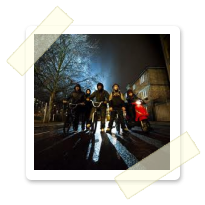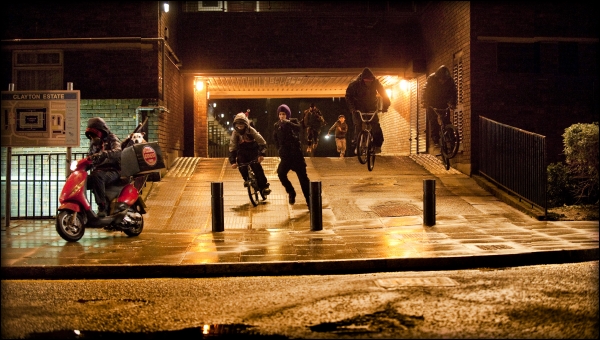Q&A with Tom Townend, Director of Photography
We speak to member Tom Townend, Director of Photography. He's shot award winning Music Promos for the likes of Adele, Artic Monkeys, Doves, Take That, Gnarls Barkley, Primal Scream and Dizzee Rascal. His commercials reel includes shoots for Audi, Marks & Spencer, Samsung, Mazda and the Tropicana 'Good Morning' advert for Rogue Films. It was this reel that caught the eye of director Joe Cornish, who chose Tom to shot his debut feature, Attack The Block.
What are you working on right now and what’s coming up in 2012?
A commercial. More commercials. Still waiting for that next brilliant feature film script to drop through the letterbox.
How did you get started in the industry?
As an undergraduate (studying photography) I fell in with various people making short films and worked on them in whatever lowly capacity I was offered. Then luck came my way when I stumbled upon a superior bunch who were making what turned out to be Lynne Ramsay's film school graduation short. That experience alone prompted me to apply to film school and I settled on cinematography more or less because it was the only subject that I thought I could blag my way in for. After film school I stared at the phone, willing it to ring, before things slowly started to take shape.
Was there a project or person that has been instrumental in your early career?
Several but the person who consistently and absurdly generously kept asking me back to help out on things was Alwin Kutchler (BSC). The first music video and the first commercial shoot I was ever involved in and the first 2nd unit shooting on a feature film where on account of Alwin asking me to perform 2nd camera duties. To this day Alwin is still the only other D.P. that I know.
You started out in promos. What did the mixture of budget limitations and creative freedom give you in those early shoots?
Well, when I first started working on music videos, back at the turn of the century, they weren't the impoverished gigs that they are now. Regularly they had six figure budgets and were every bit as lavish as commercial shoots [used to be]. I had two pieces of good fortune relatively early on that helped enormously. The first was meeting a director called WIZ (again through Alwin Kutchler) and shooting a series of pretty ambitious music videos with him. The other was shooting Lynne Ramsay's first foray into music video for The Doves ('Black & White Town'). Her approach was fairly unique - arguing that the budget which would (at that time) have usually been spent of a couple of days in a studio with a full 35mm kit & crew would be better spent on four people roaming around Glasgow with a 16mm camera for a couple of weeks filming truanting kids. She had the clout, as a feature film director, to 'take the money and run', so to speak.
With no more 35mm cameras coming off the production line, what will you miss about film & what are looking forward to exploring further with digital?
Well there's plenty of 35mm cameras that pre date the 2nd World War that are still perfectly viable for shooting today - lack of new 35mm cameras won't be what consigns film to the annals of history. Unfortunately the only exciting thing about ones and zeros is that they're finally becoming indistinguishable from 35mm. The only problem film ever had was that it was an expensive commodity for the beginner and even that constraint enforced a certain discipline and frugality that probably benefitted more than it ever hurt. Before it finally folds there's a lot of things I want to do with film that I've yet to have the chance to explore. Life will become that little bit more ordinary and dull when the agonising overnight wait for a rushes report no longer exists.
You won the MTV Award for best cinematography for ‘Rolling in the Deep’. What can you tell us about the shoot itself and did you get to collect the award on stage?
The shoot was (to date) the last music video I ever shot and as such I couldn't have asked for a better swan song. It was a good old fashioned '8.00 till midnight' slog followed by a thoroughly enjoyable morning setting fire to things as we weren't allowed to torch the paper 'city' at the location. In many ways it was a model shoot in that every aspect of it was pre-planned, relatively simple and self contained and as is typical for the director, Sam Brown, the treatment and supporting reference material left no doubt as to how it should all be approached. The performance element was utterly straightforward and Adele couldn't have been more down to earth; that alone tends to set the tone of any music video shoot.
I didn't get to collect the award on stage which is a blessing. Addressing a room full of drunk people from the music industry is my idea of hell. However I did get the MTV 'Moon Man' in the post and it is without a doubt the single most precious object in my life. It's weighty too (3.52kg to be precise) and very shiny. The plinth and name plaque it stands on leave a little to desire though; they have a cheaper quality to them, more akin to a pub darts trophy or 'World's Best Dad' cup that one might find on sale in a key cutters and heel bar.
Your commercials reel is full of stunning work, you can see the whole reel here. What do you enjoy most about shooting commercials?
That's a question that invites a facetious answer along the lines of 'the pay' or 'the travel' that I'll try to resist. Commercials are hugely variable in terms of the creative satisfaction and the level of artistic freedom one is afforded. Maybe once or twice a year something comes along which one can be proud of but that's not a bad batting average compared to other walks of life. A lot of things have to be right long before I'm involved for something to turn out well - a good idea and a sympathetic treatment for two - and even then the best laid plans can go awry. What I enjoy most is a fairly private satisfaction when something turns out as I first imagined it might.
What can you tell us about the Fantastic Journey commercial for Virgin Media?
It's a good example of a job were lots of things just went right. Not the most profound insight perhaps but perhaps if I could explain that process better then I'd be in a position to ensure it happened more often than it does! It was shot in Berlin, for reasons I'd be hard pressed to explain now, and it wasn't a particularly big budget job that had to come up to par with two preceding commercials in the same campaign that had, had huge budgets.
There was a lot of toing and froing on the design of the sets and how everything was going to look, the style of the lighting and how various transitions were going to be achieved, added to the mind numbing constrictions of location shooting on railway platforms. All the potential for disaster but it all came out in the wash. My favourite thing about it is how effectively we made a static train appear to be in motion; something that I've seen look quite bogus in plenty of films over the years.
Joe Cornish hired you for his first Feature, Attack the Block. What challenges did you face with contrast levels with a wonderful but inexperienced cast, night shoots, skin tones and the aliens themselves.
That's twelve questions disguised as one. The script was set entirely at night which is a challenge in that every single shot requires some degree of lighting. It's paradoxically a blessing though because every last shot is 'yours' and the hard work involved in lighting up city streets at night on a limited budget is nothing compared to the torment of dealing with shitty overcast locations on a budget where one is pretty powerless to influence the shitty overcast look of everything. The only problematic cast members were the pale white ones. When everyone else looked good their faces looked like energy saver light bulbs. A bigger challenge was presented by the main characters costumes. For much of the film they're wearing hoods, peaked caps and even bandanas and there was no point arguing against it as that was entirely consistent with their characters. For the aliens the problem was reversed; on only one occasions did I ever light them - so that they'd be legible against a night sky - and the rest of the time they were just there. The onus was on the VFX bods to paint out erroneous highlights later.
If you could change one thing about the film industry, what would you do?
I'd outlaw 11 day fortnights and give serious consideration to abolishing the 6 day week. If I wanted to work at the weekends I'd open a newsagents.
What do you do when you are not working?
Worry about where the next job is coming from, write letters of complaint to cinema managers and ponder about why the UK fosters so few screenwriters.
Which film or film maker do you wish you work with (who you haven’t already)
That's a hard question to answer without coming across as a bit creepy, no? I always assume that everyone already has firm friends and glowing working relationships with established collaborators so by making overtures towards any film maker would like flirting with a married woman. A bolder person than I would say 'I'd jump at the chance to shoot a film with Ridley Scott' or 'I wish I'd shot Apocalypse Now' but that's just ridiculous. If I got the call from John Waters or a new Pee Wee Herman film happens I wouldn't hesitate to say yes. I'd also better hurry up and shoot some frilly period drama soon otherwise I'll never be taken seriously as a British D.P.
Tom Townend is a member of thecallsheet.co.uk, you can see his profile here.
His UK Agent is Dinedor and US Agent is Sheldon Pronsnit.

